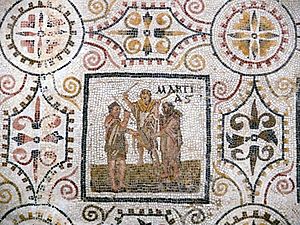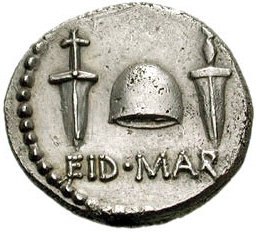Ides of March facts for kids
The Ides of March is a special day on the ancient Roman calendar. It falls on March 15th in our modern calendar. The Romans used a different way to count days, and the Ides was usually around the middle of the month. This day was important for several religious events. It also became famous because Julius Caesar was assassinated on this day in 44 BC. This event changed Roman history forever.
Contents
How Romans Counted Days
The Romans didn't number their days from 1 to 30 or 31 like we do. Instead, they had three main points in each month:
- The Kalends: This was always the first day of the month.
- The Nones: This was either the 5th or 7th day.
- The Ides: This was the 13th day for most months. But for March, May, July, and October, it was the 15th day.
They would then count backwards from these points. For example, March 14th would be "the day before the Ides of March."
Long ago, the Ides was linked to the full moon, showing that the Roman calendar started with the moon's cycles. March was actually the first month of the Roman year for a long time. This is why months like September (meaning "seventh") and December (meaning "tenth") don't match their current numbers. The Ides of March would have been the first full moon of the new year. Over time, the Ides became a day when important things happened, like paying debts or rent.
Religious Celebrations
The month of March was named after Mars, the Roman god of war. But the Ides of every month was special for Jupiter, who was the most important Roman god.
Jupiter's main priest, called the Flamen Dialis, would lead a special sheep, known as the "Ides sheep," in a parade. They would go to the Arx, a high fortress in Rome, where the sheep was sacrificed to Jupiter.
Even after January and February became the first months, March kept many of its new-year traditions. The Ides of March was also the day for the Feast of Anna Perenna. She was a goddess of the year, and her festival originally marked the end of the new year celebrations. People would have picnics and parties to celebrate this day.
Some ancient writings also mention a ritual called the Mamuralia on the Ides of March. This event involved beating an old man dressed in animal skins and possibly chasing him out of the city. This ritual might have been a way to get rid of the "old year" and welcome the new one.
Later in the Roman Empire, the Ides of March started a "holy week" of festivals. These celebrated the gods Cybele and Attis. March 15th was called Canna intrat ("The Reed enters"). This day celebrated Attis's birth, as he was found among reeds by shepherds or the goddess Cybele. A few days later, on March 22nd, was Arbor intrat ("The Tree enters"). This day remembered Attis's death under a pine tree. Priests would cut down a tree, hang an image of Attis on it, and carry it to Cybele's temple while mourning. This week of events ended on March 25th, which was the spring equinox, with a celebration of Attis's rebirth.
Julius Caesar's Assassination
Today, the Ides of March is most famous because Julius Caesar was killed on this day in 44 BC. Caesar was stabbed during a meeting of the Senate. About 60 people were involved in the plot, led by Brutus and Cassius.
A fortune-teller had warned Caesar that something bad would happen to him on the Ides of March. As Caesar walked to the meeting where he would be killed, he saw the fortune-teller and joked, "Well, the Ides of March are come!" He meant that the day was here, and nothing bad had happened. The fortune-teller replied, "Aye, they are come, but they are not gone." This famous moment is shown in William Shakespeare's play Julius Caesar, where the fortune-teller tells Caesar to "beware the Ides of March."
Caesar's death led to more civil wars in Rome. His adopted son, Octavian, eventually won these wars. In 27 BC, Octavian became the first Roman emperor, Augustus, and this ended the Roman Republic.
Some Roman writers saw Caesar's murder as a terrible act because he was also Rome's chief priest. Four years after Caesar's death, Octavian took revenge. He executed 300 senators and knights who had fought against him. This happened on the Ides of March and was seen by some as a religious sacrifice to honor the now deified Julius Caesar.
|
Related pages
- Julius Caesar, a play by William Shakespeare
See also
 In Spanish: Idus de marzo para niños
In Spanish: Idus de marzo para niños
 | Jessica Watkins |
 | Robert Henry Lawrence Jr. |
 | Mae Jemison |
 | Sian Proctor |
 | Guion Bluford |



